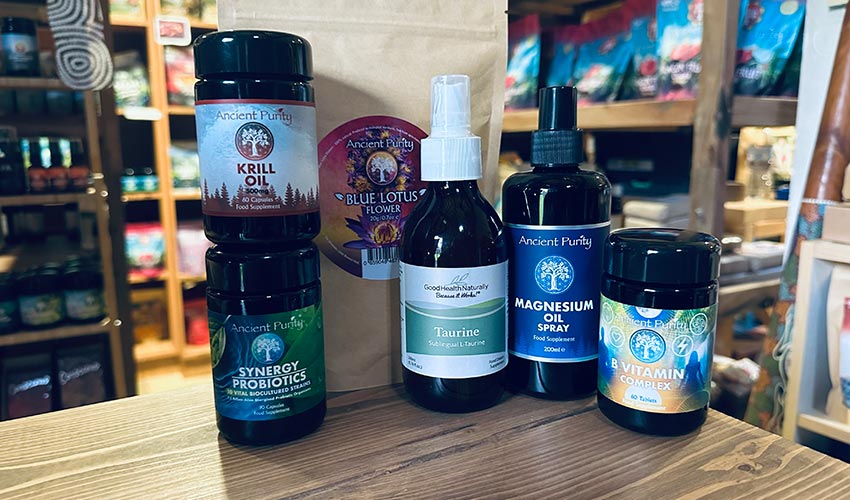Freedom from Epilepsy... Ancient Remedies & Modern Developments
Here we are in a deep dive guide, I'm apprehensive to write articles / guides on subjects that are quite serious health issues. It's my mission to get people to help themselves naturally but big Pharma and its power is scary, but the information must be shared. Ultimately it's for the reader to decide what they make of it and any action they take. Epilepsy is a neurological disorder affecting nearly 50 million people worldwide, so it's big. It is often characterised by unpredictable seizures and challenges in daily life.
While conventional treatments such as anti-seizure medications have proven effective for many, there is growing interest in natural, holistic approaches that aim to complement or even replace traditional therapies. These methods, grounded in both ancient practices and modern scientific research, offer promising hope for those seeking alternative solutions. Because ultimately you want freedom, not management, we want to live our best life right. Anyway here is all my info and research compounded into one.

Start with Food
Obviously you know the drill by now, cut out all processed food. Avoid high amounts of sugar in the diet, ween off of it, use Apple Cider Vinegar 20 mins before a meal to help reduce post meal sugar cravings and help blood glucose. Then consider the Ketogenic Diet, it doesn't have to be permanent, but consider this a base diet. The ketogenic diet, initially developed in the 1920s to treat epilepsy, has its roots in fasting—a practice documented in ancient Greek medicine as a method for reducing seizure activity. The ketogenic diet is high in fats and extremely low in carbohydrates, forcing the body to use fat rather than glucose as its primary fuel source.
Multiple studies have demonstrated the ketogenic diet's effectiveness in reducing seizure frequency, especially in children with drug-resistant epilepsy. A 2016 study published in The Lancet Neurology confirmed that nearly 50% of patients on the ketogenic diet experienced a significant reduction in seizures, while 10-15% became seizure-free. The diet works by altering the brain's metabolism, increasing the production of ketone bodies, which have been found to have neuroprotective effects. While I'm going to go into supplements and herbs further down and they can play a significant role in management, the dietary choices can further enhance brain function and reduce seizure risk. So I do want to bring your attention to the Low-Glycaemic Index Diet (LGID). Like the ketogenic diet, the Low-Glycaemic Index Diet focuses on stabilising blood sugar levels by avoiding foods that cause rapid spikes in glucose. This diet includes whole grains, legumes, non-starchy vegetables, and moderate protein intake. A study published in Seizure: European Journal of Epilepsy found that LGID helped reduce seizures in individuals for whom medication was ineffective.
Although in the supplements I am going to suggest Krill Oil, we have to focus on diet first. Omega-3 fatty acids, found in fish like salmon, flaxseeds, and walnuts, are known for their anti-inflammatory properties and positive effects on brain health. Research has suggested that omega-3s may reduce neuronal excitability, thus lowering the risk of seizures. A 2014 study from the American Epilepsy Society reported that patients taking omega-3 supplements experienced a reduction in seizure frequency. Additionally, omega-3s are essential for overall cognitive function and maintaining healthy brain cell membranes.

The Other Lifestyle Essentials
Let Food be Thy Medicine and massively realise the importance of the following, believe in the life changing affects of supplements, herbs and Elixirs too. So first off maybe even more important than what you eat is Sleep. Sleep deprivation is a known trigger for seizures. Ensuring consistent, high-quality sleep is essential for managing epilepsy. Creating a sleep-friendly environment, maintaining a regular sleep schedule, and avoiding stimulants before bedtime can make a significant difference in seizure control. Rather than take up a lot of space telling you check out my Healthy Sleep Guide here.
Stress is a common trigger for seizures in many individuals with epilepsy. Incorporating mindfulness practices such as meditation, yoga, and deep breathing exercises can help reduce stress and lower the likelihood of seizures. Studies, including one from the Journal of Clinical Psychology, show that mindfulness-based stress reduction (MBSR) techniques can decrease seizure frequency by improving emotional regulation and reducing anxiety. I imagine some of you may be totally new to this, so I'll say these simple basics, you can always look into the realm of mental well-being and peace more, we even have a section titled Mindfulness here but try out these below
- Meditation and Mindfulness: Techniques like deep breathing, guided meditation, and progressive muscle relaxation can calm the nervous system and reduce seizure risk.
- Yoga and Tai Chi: These practices combine gentle physical activity with breathwork and mindfulness, promoting relaxation and overall well-being.
- Counselling and Therapy: Cognitive-behavioural therapy (CBT) and other forms of talk therapy can help manage anxiety and stress, both of which are linked to seizure activity.
Regular Physical Exercise
Hopefully I'm preaching to the converted but if you have not yet used exercise as a tool then it's time. Exercise is beneficial for brain health and can improve overall well-being, mood, and sleep. Physical activity may also help in reducing seizure frequency, as it regulates brain chemistry and lowers stress levels.
- Moderate aerobic exercise such as walking, swimming, cycling, or jogging is recommended.
- Strength training can also promote overall body health.
- Yoga or Pilates: Low-impact exercises that improve flexibility and strength while promoting relaxation.
It’s important to avoid overexertion and stay hydrated, as extreme fatigue and dehydration could trigger seizures in some people. Personally I think it's best to use some Celtic Sea Salt and or some Electrolytes. We have both at the site, but here is Celtic Sea Salt.
I wanted to also talk about neurofeedback, a type of biofeedback where individuals learn to regulate their brainwaves through real-time monitoring. Studies have found that neurofeedback can help reduce abnormal brain activity linked to seizures, empowering individuals to gain more control over their neurological responses. It's not something I can tell you too much about from experience and I don't want to write more about it as I don't know so much on the effect on Epilepsy, just what I read. My point is from what I saw I think it's worth you researching further. Now I'll go into supplements.

Supplements & Herbs to Help Bring Balance
Historically, epilepsy has been treated with various natural remedies rooted in traditional medicine. Many ancient civilisations viewed epilepsy as a spiritual or supernatural condition, but some cultures also recognised the potential of certain herbs and foods to alleviate symptoms. While ancient remedies laid the groundwork, modern science has begun to validate the benefits of certain natural supplements for epilepsy management.
Blue Lotus Flower: In ancient Egypt, the Blue Lotus Flower was revered for its calming and mind-altering properties. It was traditionally used in rituals and medicinal practices, believed to aid in achieving mental clarity and tranquillity. While studies specifically linking Blue Lotus to epilepsy management are sparse, the flower's calming effects on the nervous system have been documented, suggesting it could help reduce seizure frequency in those with stress-induced triggers. I sometimes smoke it but you can have it as a tea, obviously if it's a child then tea only. Find it here.
Valerian Root & Passionflower: Traditional European remedies, particularly those using herbs like valerian root and passionflower, have long been associated with calming the nervous system. These herbs are still used today as natural treatments for anxiety, insomnia, and seizures. Valerian, rich in valerenic acid, has been shown to modulate GABA, a neurotransmitter responsible for calming neural activity, which can potentially reduce seizure activity. Similarly, passionflower has sedative qualities that may provide relief for individuals with epilepsy.
Magnesium: Magnesium, an essential mineral involved in over 300 biochemical reactions in the body, plays a vital role in stabilising electrical activity in the brain. Studies have shown that magnesium deficiency can lead to hyper-excitability of neurons, increasing the risk of seizures. One study, published in The Journal of Clinical Neurology in 2012, demonstrated that magnesium supplementation could significantly reduce seizure frequency in epileptic patients. Adding magnesium-rich foods such as dark leafy greens, seeds, and nuts to your diet, or taking magnesium supplements, may provide seizure relief by regulating neural excitability. The Oil is powerful or use the MG Capsules, The Magnesium Oil is the most economical, spray it under the arms and on stomach. Find it here.
CBD Oil: Cannabidiol (CBD), a compound derived from the cannabis plant, has gained widespread attention for its potential in treating epilepsy. Unlike THC, the psychoactive compound in cannabis, CBD is non-intoxicating and has been shown to possess anticonvulsant properties. A landmark study published in The New England Journal of Medicine in 2017 found that CBD significantly reduced seizure frequency in patients with Dravet syndrome, a severe form of epilepsy. This led to the development and FDA approval of Epidiolex, a CBD-based medication for epilepsy. Although the long-term effects of CBD are still being studied, it represents one of the most promising natural treatments for epilepsy in modern times.
Krill Oil: Krill has Anti-Inflammatory Power, totally supportive to brain health. By reducing inflammation, krill oil may help lower neural excitability and the overall likelihood of seizures. A study published in Epilepsy & Behaviour in 2012 suggested that omega-3 fatty acids can help reduce seizure frequency, particularly in patients with drug-resistant epilepsy. DHA, one of the primary components of krill oil, is essential for brain health. It plays a critical role in maintaining the structure and function of neuronal membranes. In epilepsy, neuronal damage caused by excessive electrical activity during seizures can lead to further complications. By promoting the repair and maintenance of neuronal cells, krill oil may help protect against the long-term effects of repeated seizures. Additionally, studies have shown that omega-3 fatty acids support synaptic plasticity, which is the brain's ability to adapt and rewire itself. This plasticity is essential for preventing or reducing the recurrence of seizures. I highly recommend Krill Oil, find it here.
Taurine: A Lesser-Known Amino Acid Taurine, an amino acid found in animal products, is essential for regulating the electrical activity of cells, particularly in the brain. Taurine has been used for decades in the treatment of epilepsy due to its ability to inhibit neurotransmission and reduce neuronal excitability. Research published in the journal Epilepsy Research in 2015 showed that taurine supplementation reduced seizure activity in animal models, highlighting its potential as a natural treatment for epilepsy. You can find Taurine Oral Spray here.
Vitamin B6 (Pyridoxine): A deficiency in Vitamin B6 has been linked to increased seizure activity in both adults and children. This is because Vitamin B6 is necessary for the production of GABA, a neurotransmitter that regulates brain activity. In some cases, supplementing with pyridoxine has been shown to stop seizures altogether, particularly in children with pyridoxine-dependent epilepsy, as demonstrated in research published in The Lancet. B6-rich foods include poultry, fish, and bananas, making these easy additions to an epilepsy-supportive diet. There is enough of Vitamin B6 in our B Vitamin Complex here.
Probiotics: Emerging research suggests that gut health may play a crucial role in neurological conditions, including epilepsy. The gut-brain axis, a bidirectional communication system between the gut and the brain, influences neural activity. Probiotics, found in fermented foods like yoghurt, sauerkraut, and kimchi, can improve gut health and may positively affect brain function. A 2020 study published in Frontiers in Neurology found that a probiotic-rich diet could reduce seizure activity in animal models, showing the potential for gut-targeted therapies in epilepsy. I honestly think we have the best simple Probiotic around, you can find it here.

There is Hope Through Holistic Healing
While epilepsy is a complex and challenging condition, there is undeniable hope in both ancient remedies and modern natural therapies. From traditional herbs like valerian root and passionflower to cutting-edge supplements such as CBD oil and magnesium, a holistic approach to epilepsy offers promise for improved quality of life and, in some cases, long-term seizure control. Diet, lifestyle changes, and supplementation can work synergistically to support the brain’s natural ability to regulate itself, offering a brighter, more hopeful future for those living with epilepsy.
By integrating these natural treatments with professional medical guidance, those with epilepsy may discover a path towards better health and fewer seizures. There is hope—and it is rooted both in the wisdom of the past and the science of today. Below are some of the references for info I shared, I wish you health in freedom over Epilepsy. Be Well, Tom
References:
- Epilepsy Research, 2015: Taurine and Seizure Activity
- The New England Journal of Medicine, 2017: CBD Oil and Dravet Syndrome
- Seizure: European Journal of Epilepsy: Low-Glycaemic Index Diet and Seizure Reduction
- The Journal of Clinical Neurology, 2012: Magnesium and Seizure Frequency
- The Lancet Neurology, 2016: Ketogenic Diet and Seizure Reduction






















